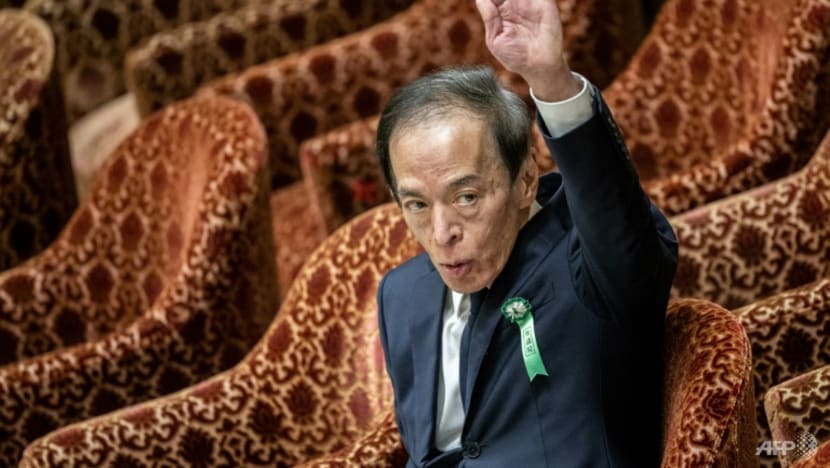End of an era as economist Kazuo Ueda takes over Haruhiko Kuroda as Bank of Japan governor on Sunday
Unlike past governors who traditionally hailed from the central bank or the powerful Finance Ministry, Mr Ueda is an academic by training.

TOKYO: Economist Kazuo Ueda is set to succeed Mr Haruhiko Kuroda as the governor of the Bank of Japan (BOJ) on Sunday (Apr 9).
Unlike past governors who traditionally hailed from the central bank or the powerful Finance Ministry, Mr Ueda is an academic by training. The 71-year-old, formerly a professor at Kyoritsu Women's University, was a BOJ board member from 1998 to 2005.
He was also the chief councillor of the Institute for Monetary and Economic Studies, the BOJ's think tank.
“(Mr Ueda) may not drastically change the old framework of Mr Kuroda,” said Nomura Research Institute’s executive economist Takahide Kiuchi.
“But he may analyse each policy and try to reduce the side effects of each monetary policy framework, such as negative interest rate policy and equity control and asset purchase scheme.”
For instance, Mr Ueda has argued that the negative interest rate policy in Japan is harming profit conditions of regional banks, Mr Kiuchi said, adding that Mr Kuroda’s successor wants to increase or cancel the negative interest rate policy .
“I think when he changes monetary policy he may take into account external conditions, the economy and the financial market,” said Mr Kiuchi.
MR KURODA’S LEGACY
Mr Kuroda’s end of tenure on Saturday will mark the end of an era.
When the former Asia Development Bank chief took the BOJ top job a decade ago, Japan was still recovering from the 2008 financial crisis and the 2011 Great East Japan Earthquake.
Handpicked by the late former prime minister Shinzo Abe to fire one of the three arrows of his Abenomics economic policy, Mr Kuroda unleashed unprecedented monetary stimulus that was credited for jolting Japan out of its economic doldrums.
Professor of Economics Sayuri Shirai from Keio University noted that between 2013 and 2019, Japan experienced exponential growth in the number of tourists.
“That really contributed to Japan’s services recovery,” said Prof Shirai from the Faculty of Policy Management.
She also noted that Tokyo’s selection as the host for the 2020 Olympics in 2013 prompted city development, construction, hotels, and several development projects.
“Together with BOJ's low interest rate it created a lot of activities in the services sector,” she said.
CHALLENGES MR UEDA MAY FACE
However, Japan is still haunted by its deflationary past, with Mr Kuroda's ultra-loose monetary policy blamed for keeping debt-ridden zombie companies alive.
Prof Shirai said that while it is “really helpful” when interest rates are low, maintaining a very low interest rate for the long term may hamper further corporate restructuring in a time of global uncertainties.
“Unviable companies stay there. We have a labour shortage. Those labour forces should be transferred to more viable companies. More money should be allocated to more viable companies,” she said.
With Mr Ueda’s reputation as a pragmatic theorist, some analysts have said he will eventually move out of Mr Kuroda’s shadow and chart his own path.
However, in a sign he will be in no rush to shift policies, Mr Ueda told a parliamentary confirmation hearing in February that he will "spend time and engage in thorough discussions" with BOJ board members on how to address the side-effects of prolonged easing.
















